- Home
- J. T. Edson
Texas Killers Page 9
Texas Killers Read online
Page 9
Nor was the small Texan enamored of the prospect of compelling the deputies to let him explain. Not that doing so would be difficult. He had holstered his Colt after looking into the alley, but could draw either it or its mate before bringing the peace officers into the office. Although they would not be likely to resist, having heard of “Rapido Clint’s” ability with a gun, he would have to exhibit the document which he had shown to Digbry to ensure that he was believed. He felt sure they would be willing to accept Dusty Fog’s explanation, but could not rely upon them to keep the secret of his true identity.
While Dusty would have had misgivings over the course he decided to adopt if he had been dealing with honest and efficient peace officers, he doubted whether the local deputies were competent to investigate their superior’s murder. So they would not be hindered in their work if he left them to find Digbry’s body in their own time. Waiting until they had escorted their prisoner to the cells, he left by the office’s side entrance. Nobody challenged his departure, nor did he hear anything to suggest the peace officers had discovered what had happened to the marshal as he walked along Dock Street in the direction of the hotel.
Chapter 8
THAT KNIFE WASN’T AIMED AT ME
“FLORENCE HAS JUST BEEN SAYING THAT SHE WONDERS if you don’t like girls, Waco,” the beautiful young woman who had been introduced as Lady Winifred Amelia Besgrove-Woodstole remarked, after she had descended from the box of the chuck wagon in which she and the maid had ridden to Corpus Christie. “Or is it English people in general you don’t care for?”
Still puzzled by the change which had come over first Mark Counter, then the Ysabel Kid and Waco on being presented to her, the Lady was hoping to discover what had caused it. From the beginning, she had considered that the latter—being the youngest of the trio—might prove to be the most amenable to her persuasive charms and supply the solution. On hearing how the journey to the town was to be made, she had hoped to be granted an opportunity to question him and, having arrived, she felt the time had come.
In addition to having called a halt so that he could ask about the other members of Crown Prince Rudolph’s retinue at the livery barn from which the wagon and its team had been hired, Colonel Wilhelm Liebenfrau was making use of the establishment’s “back house” to answer the call of nature. His orderly had accompanied him on a similar mission. Waco had stayed with the riding horses, a short distance from the wagon, and was scanning the surrounding buildings. None was closer than fifty yards and all were in darkness, showing no sign of being occupied. From all appearances, the newcomers had the whole area to themselves. It was a situation which offered the Lady the privacy her interrogation required.
“Well now, ma’am,” the youngster replied, remembering not to remove his hat from his head. He had exchanged his Stetson for the high “sugarloaf” crowned white Mexican sombrero before commencing the return journey from the rendezvous and removing it as he usually would have done when addressing a member of the opposite sex, would have betrayed his disguise. He had also donned and was still wearing a long, voluminous serape to conceal almost all of his clothing with the exception of his boots, into which he had tucked the legs of his Levi’s pants. “I’m not like one certain jasper I know’s I’ll leave nameless, called Mark Counter, who spends ’most all of his waking time chasing the gals bow-legged, but I like them just fine I reckon.”
“Then it must be that you don’t like us English people?” the Lady suggested.
“Can’t say’s I’ve met too many of you English folks,” Waco answered. “But the Kellers up to the Indian Nations1 come out to be real nice folks when we got to know them.2 And they don’t come no better nor finer’n lil ole Babsy Smith and her boss-lady up to Mulrooney, Kansas.”
“Babsy Smith!” the Lady repeated, darting a glance to where her maid was watching and listening on the box of the wagon. Returning her gaze to the young Texan, her voice and face resumed their friendly tone and expression as she continued, “That’s an unusual Christian name. Are you sure that she is English?”
“She told me she was a ‘Cockney,’ or some such, which she allowed’s about’s English as they come,” Waco elaborated, grinning a little at the memory of the buxom and vivacious little blonde saloon-girl with whom he had been on very close terms while acting as Dusty Fog’s least experienced deputy town marshal in Mulrooney.3 Showing no sign of having noticed the reaction produced by his mention of her, he went on, “And Miss Fre—!” He broke the words off abruptly, realizing that to continue with them might give more away than was desirable and could even supply the information which he suspected his interrogator was seeking. “Whooee! Time it’s taking the Colonel, he should try drinking some croton oil.”
“I don’t understand,” the Lady declared, genuinely puzzled in spite of the conversation having left the subject in which she was most interested.
“Likely you-all don’t have it in England, but it’s what folks out here drink when they go out back and can’t do what they’ve gone for,” the youngster explained, none too succinctly. “It’s always worked pretty well for me, times I’ve had to use it. Happen you’ll excuse such talk in the company of two ladies.”
“We will and I think we call something like it ‘cascara,’” the Lady replied, a smile twisting at her lips as she understood Waco’s meaning. However, appreciating that they were straying from the matter toward which the conversation had previously been directed, she tried to raise it once more. “If your friend really is a Cockney, she must be English. But however did she come to be in the United Sta—?”
“Is there any sign of His Highness yet, young man?” Colonel Liebenfrau called, striding as smartly as if marching on a parade from the well lit interior of the livery barn with his orderly following and carrying a lantern. They were both wearing clothing of range country style and, although it no longer carried the saber on its slings, the officer still retained his military belt with its bolstered revolver. However, as many men who had served in the Confederate or Union Armies made use of similar equipment, this was not detrimental to the disguise. “Neither he nor the other party have been here yet.”
“Can’t see anything of them, Colonel,” Waco answered, without commenting that the darkness and the various buildings around the barn rendered any sighting at a distance most unlikely. He was not sorry to have had the discussion with the Lady brought to an end, so pointed out, “We came in along the Coast Road, which’s a shorter way of hitting town than either Lon or Mark’ll be coming. But they shouldn’t be too much longer afore they show up. Happen you’re so minded, we can wait for them here instead of going straight to the Blaby place.”
“I would like to go straight there, Colonel, so that I can change into something a trifle more suitable for the reception,” the Lady suggested. “But if you would rather stay here until His Highness arrives, perhaps Waco could take me there.”
“Mark said’s I was to take you-all to the Blaby place, Colonel,” the youngster pointed out, before the Personal Attendant could reply and, while polite, his voice held a tone which brooked no argument. His eyes flickered to the Lady and he finished, “So, much’s I’d admire to go along with you, ma’am, that’s what I have to do. Either we all go, or we all stay put until the others come.”
Having heard the instructions to which Waco was referring, Liebenfrau gave a stiff nod of agreement. In spite of his apprehensions over the current situation, he admired the youngster for being willing to carry out orders which might be contrary to the wishes of a person of superior social standing.
The Personal Attendant might have the appearance of being a typical Prussian-trained senior officer, but he possessed a flexibility of thought and a willingness to accept unconventional tactics or methods which was not a general character trait of men educated under that exacting military code. While he had had misgivings over one aspect, he was willing to concede that the arrangements to ensure the safe arrival of Crown Prince Rudloph in Corpus Christie ha
d been planned with considerable forethought. Nor could he fault the way in which they were being carried out.
Not only had attire suitable for their surroundings been provided for the royal visitor and his retinue, but there was sufficient of it in various sizes to ensure each member found garments to fit him. Nor had the disguising ended there. The men who were to act as escort had helped the deception by making alterations to their own appearances. What was more, although they had set out that morning for the rendezvous riding their usual mounts, they had had other less distinctive and eye-catching horses waiting about two miles from the town upon which they could make the return journey. Even having the visitors bring some of their baggage ashore had been a furtherance of the scheme. When the matter was “accidentally” mentioned by the captain and selected members of the U.S.S. Nantucket’s crew, it was hoped that any would-be assassins who heard would assume their intended victim was to be kept away from Corpus Christie until at least the following day.
However, a futher precaution had disturbed Liebenfrau when he was told of it. In spite of appreciating how splitting up the party into three groups and travelling by different routes would lessen the chance of the ploy being detected, he had objected on learning that he and the Crown Prince would not be continuing the journey together. He had pointed out that, in his capacity as Personal Attendant, he should accompany his sovereign lord at all times. Once again, it had fallen upon Rudloph to insist upon accepting Mark Counter’s wishes. So Liebenfrau had ridden along the Coast Road at the side of the chuck wagon, which was driven by his orderly. The Lady and her maid were passengers and Waco had acted as their guide.
Apart from Liebenfrau using a shotgun to bring down a few quail, the journey had been uneventful. A very careful watch was kept, but the party had neither met nor seen any other human beings. Carrying out his instructions, the youngster had made sure that they did not come into sight of Corpus Christie during the hours of daylight. It had been dark for almost an hour when they arrived at what proved to be a deserted livery barn.
While the Personal Attendant had not mentioned his misgivings, it had been apparent to the others of his party that he was uneasy. They had realized that he was having difficulty in reconciling himself to being separated from the Crown Prince when there was a possibility of danger.
“We will go to the mansion, Lady Winifred,” Liebenfrau declared, stopping and looking over his shoulder at the orderly, reverting to his native tongue. “Bleiben sie hie—!”
Something that glittered metallically hissed from the darkness. Travelling at high speed, it almost touched the Colonel’s neck in passing. In fact, if he had not paused with the intention of telling his orderly to stay at the livery barn until the arrival of the Crown Prince, the missile would have struck him. Missing, it sank into the side of the wagon and, vibrating, revealed itself to be a knife.
Swinging around, trying to decide from whence the weapon had come, Waco sent his hands flashing downwards. He was acting with the trained reflexes of a highly competent gun-fighter, but for once found them to be putting him at a disadvantage. Instead of enfolding the staghorn butts of his Army Colts, he found himself grasping the harsh material of the blanket-like serape.
Letting out a startled oath in guttural German, the orderly showed presence of mind by throwing aside the lantern. Its light was extinguished as it struck the ground, bringing darkness to the side of the wagon upon which the party were standing and rendering them far less open targets for the unseen assailant. Having done so, grabbing at the holster on the right side of his belt, he started to run in the general direction from which the knife had come.
Employing language which he would not have thought of using in the presence of two women under less trying circumstances, Waco sent the sombrero flying as he dragged the offending serape over his head. Although as yet he had not grasped the full significance of what he had seen, the way in which the knife had been thrown and dug into the side of the wagon warned him against taking chances when going up against its owner. So he had no intention of advancing until he had rid himself of what might prove an impediment to rapid movement.
“Look after the ladies, Colonel!” the youngster snapped, tossing the garment aside and noticing that the beautiful blonde was producing a Remington Double Derringer from the right side pocket of her jacket.
Drawing his Colts, without waiting to see whether Liebenfrau was obeying, Waco moved forward. He had not seen exactly where the knife had been thrown from, so did not follow the orderly. Instead, he made for the opposite end of the nearest building. Before he had covered half the distance, certain factors began to imprint themselves upon his mind. However, he did not allow them to distract him or to interfere with his cautious scrutiny of the terrain ahead.
The youngster’s range of vision was extremely restricted. None of the light from the doors of the barn spread even as far as his present position. Because of other buildings beyond that which he was approaching, he could not see if the alley had an occupant. So he slowed his pace, moving warily and employing all the knowledge of night fighting he had accrued from that acknowledged master, the Ysabel Kid.
Showing less restraint and caution, the Bosgravnian orderly was already entering the alley at the other end of the building. He had succeeded in drawing his revolver, but Waco considered that his behavior was ill-advised, even reckless in the extreme. Watching the man disappear, the youngster strained his ears to catch the slightest warning that the soldier might be paying for the rashness, and to try and detect any lurking enemy in the blackness toward which he himself was heading.
Flattening his back against the front wall of the building, Waco glanced at the wagon. He found that Liebenfrau had acted upon his instructions. From what he could make out, the Personal Attendant and the Lady had gone around the vehicle and the maid was no longer on its box. Satisfied that they were sheltered, at least until whoever had thrown the knife moved to another position, he gave his attention to the work in hand.
Carefully, pleased that he had already discarded the sombrero, the youngster crouched and peered around the corner. Even from the lower position he was unable to see anything in the inky darkness of the alley, and he was painfully aware that, on entering, he could be sky-lined for whoever was further along.
“Oh hell!” Waco mused, as he started to ease himself around the corner. “Who wants to live forever, ’cepting maybe m—!”
The thought was terminated as the youngster heard a slight scuffle from the other side and rear of the building. It was followed by an exclamation he could not understand, but knew was being made by the Bosgravnian orderly. The words ended in a hissing gasp of pain which was followed by light footsteps departing rapidly.
Swinging around, Waco raced by the front of the building. He showed no hesitation over turning the corner on reaching the other end. However, he slowed his pace and continued his advance with the care he had previously exhibited once he was in the alley. While there had been the suggestion that somebody was leaving the vicinity hurriedly, it was not necessarily the knife-thrower. With that disturbing thought in mind, stepping warily so each foot felt ahead to make sure it did not strike anything which would make a sound and betray him, he went onward. There were the usual night noises of a busy town in the background to drown his furtive movements, but they would also muffle any made by a person waiting in ambush.
Nothing happened as the youngster continued his advance. Reaching the rear of the building, he adopted the same precautions as he had at the front. The visibility was a trifle better, but he found neither pleasure nor relief in what he saw. A few feet away, a bulky dark shape was huddled half sitting, half lying against the end of the next structure. He did not need to exercise his deductive prowess to know what it was.
After scanning the surrounding area without detecting any sign of human life, Waco bolstered his left hand Colt and walked forward. Kneeling he reached and touched the unmoving body of the orderly. He remembered a technique he ha
d learned from Doc Leroy and started to feel under the man’s chin. Something wet met his questing fingers, but he was unable to locate the pulsing movement which would be a sign of life. Yet there did not appear to be much blood flowing, nor any extensive injury to account for it if that was what the warm and slightly sticky liquid was.
Having satisfied himself that the orderly was dead, the youngster gazed around. He accepted the futility of trying to find whoever had struck the soldier down. So he swung around and his toe kicked something. Wondering if it might be the murder weapon, he bent and felt until he found and picked it up. It appeared to be a fairly thin piece of almost round wood with a bone hook at one end. Puzzled, he took it with him as he started to retrace his footsteps through the alley. As he went, he dropped the other Colt back into leather.
“Where is Hoffmeyer?” Liebenfrau demanded, emerging from behind the wagon as the young Texan approached.
“Dead,” Waco replied, picking up the lantern.
“Dead?” the Personal Attendant demanded and his voice showed concern. “How?”
“I don’t know, Colonel,” Waco admitted, hooking the stick he had found on to his gunbelt and reaching into his Levi’s hip pocket. “That’s why I’ve come back for the lantern, so I can find out.”
“I’ll come with you!” Liebenfrau stated.

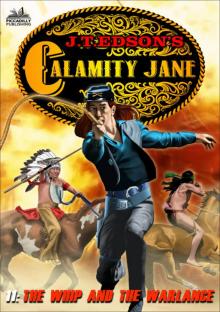 Calamity Jane 11
Calamity Jane 11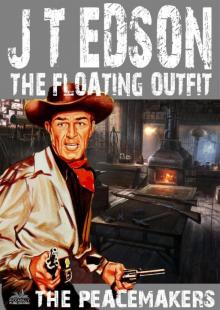 The Floating Outift 33
The Floating Outift 33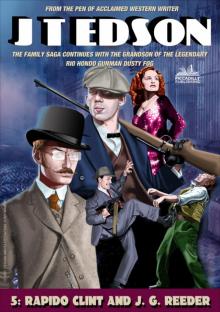 Cap Fog 5
Cap Fog 5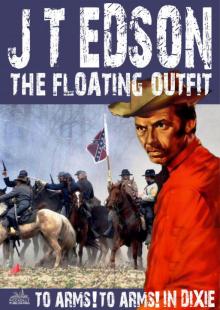 The Floating Outfit 34
The Floating Outfit 34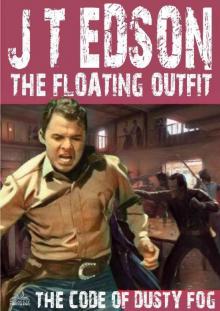 The Code of Dusty Fog
The Code of Dusty Fog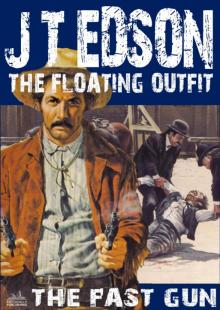 The Floating Outfit 21
The Floating Outfit 21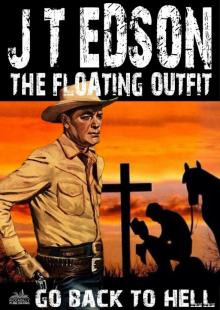 The Floating Outift 36
The Floating Outift 36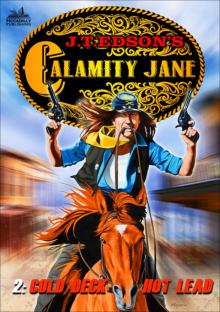 Calamity Jane 2
Calamity Jane 2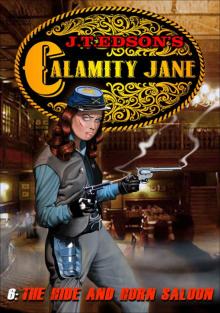 Calamity Jane 6: The Hide and Horn Saloon (A Calamity Jane Western)
Calamity Jane 6: The Hide and Horn Saloon (A Calamity Jane Western)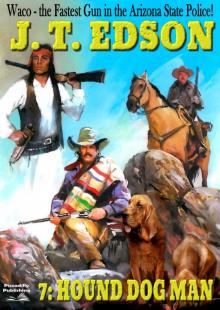 Waco 7
Waco 7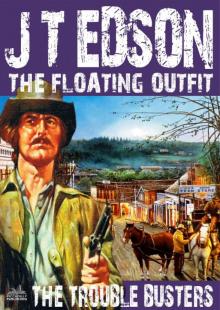 The Floating Outfit 25
The Floating Outfit 25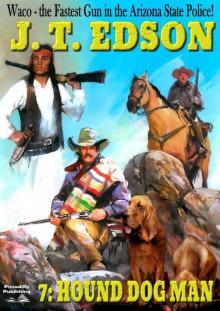 Waco 7: Hound Dog Man (A Waco Western)
Waco 7: Hound Dog Man (A Waco Western)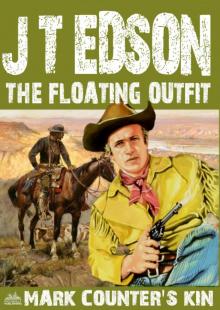 The Floating Outfit 47
The Floating Outfit 47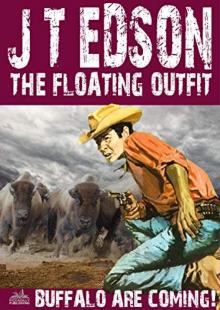 The Floating Outfit 42: Buffalo Are Coming!
The Floating Outfit 42: Buffalo Are Coming!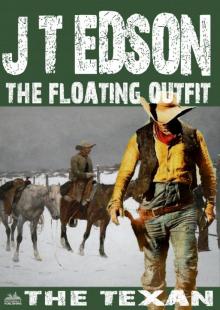 The Floating Outfit 46
The Floating Outfit 46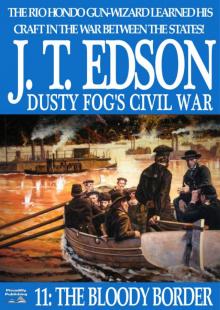 Dusty Fog's Civil War 11
Dusty Fog's Civil War 11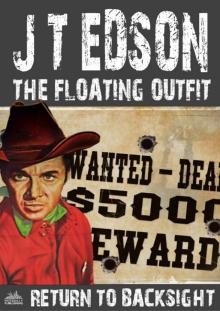 The Floating Outfit 61
The Floating Outfit 61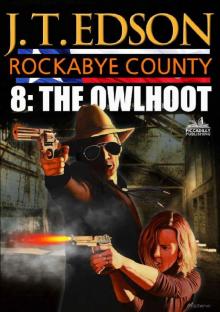 The Owlhoot
The Owlhoot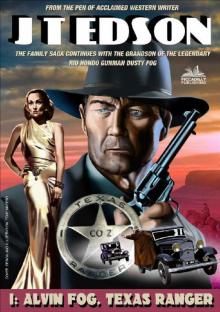 Alvin Fog, Texas Ranger
Alvin Fog, Texas Ranger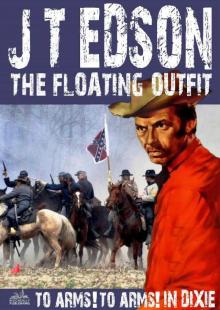 The Floating Outfit 34: To Arms! To Arms! In Dixie! (A Floating Outfit Western)
The Floating Outfit 34: To Arms! To Arms! In Dixie! (A Floating Outfit Western)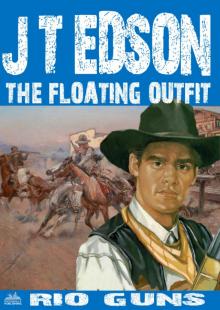 The Floating Outfit 44
The Floating Outfit 44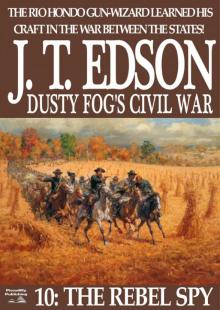 Dusty Fog's Civil War 10
Dusty Fog's Civil War 10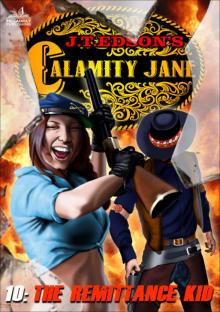 Calamity Jane 10
Calamity Jane 10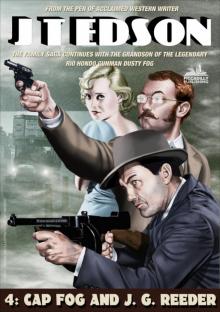 Cap Fog 4
Cap Fog 4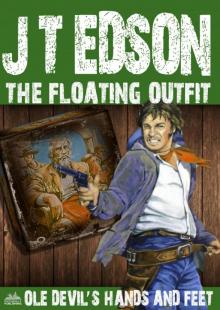 The Floating Outfit 51
The Floating Outfit 51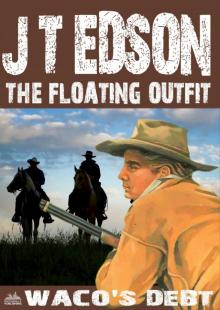 The Floating Outfit 50
The Floating Outfit 50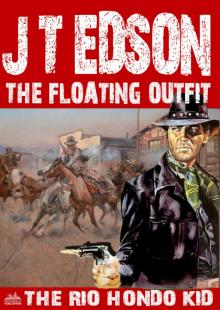 The Floating Outfit 49
The Floating Outfit 49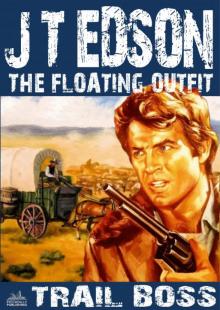 The Floating Outfit 10
The Floating Outfit 10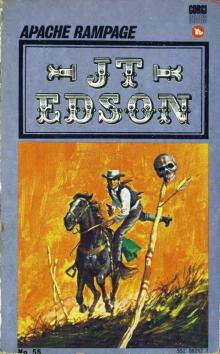 Apache Rampage
Apache Rampage The Floating Outfit 15
The Floating Outfit 15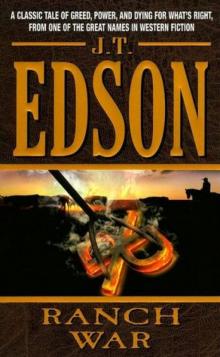 Ranch War
Ranch War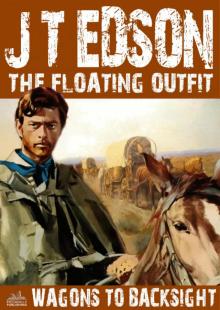 The Floating Outfit 11
The Floating Outfit 11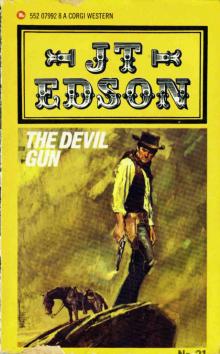 The Devil Gun
The Devil Gun Sacrifice for the Quagga God (A Bunduki Jungle Adventure Book 3)
Sacrifice for the Quagga God (A Bunduki Jungle Adventure Book 3)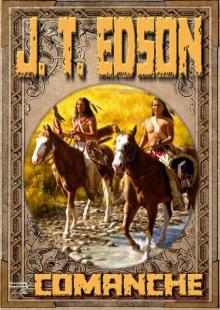 Comanche (A J.T. Edson Western Book 1)
Comanche (A J.T. Edson Western Book 1)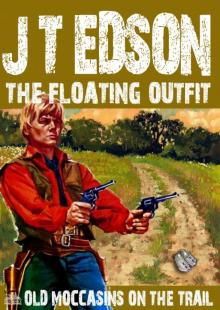 The Floating Outfit 48
The Floating Outfit 48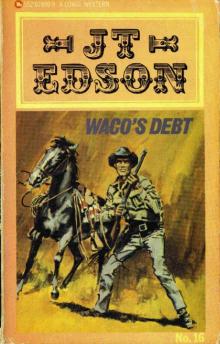 Wacos Debt
Wacos Debt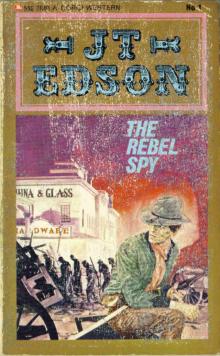 The Rebel Spy
The Rebel Spy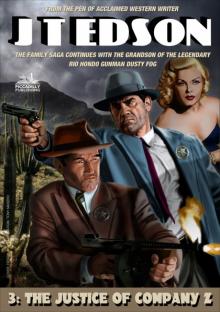 Cap Fog 3
Cap Fog 3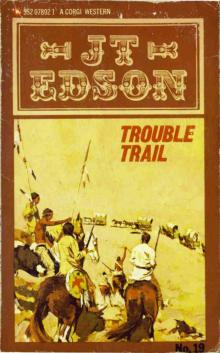 Trouble Trail
Trouble Trail Cold Deck, Hot Lead
Cold Deck, Hot Lead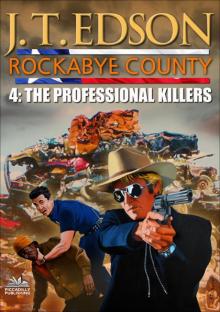 Rockabye County 4
Rockabye County 4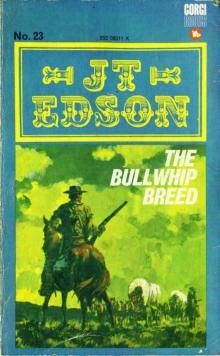 The Bullwhip Breed
The Bullwhip Breed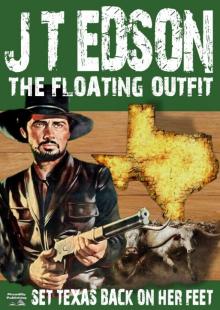 Set Texas Back On Her Feet (A Floating Outfit Western Book 6)
Set Texas Back On Her Feet (A Floating Outfit Western Book 6)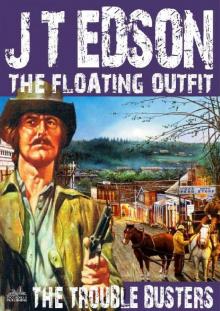 The Floating Outfit 25: The Trouble Busters (A Floating Outfit Western)
The Floating Outfit 25: The Trouble Busters (A Floating Outfit Western) Fearless Master of the Jungle (A Bunduki Jungle Adventure
Fearless Master of the Jungle (A Bunduki Jungle Adventure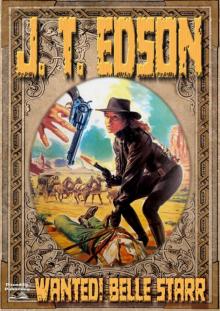 Wanted! Belle Starr!
Wanted! Belle Starr! The Big Hunt
The Big Hunt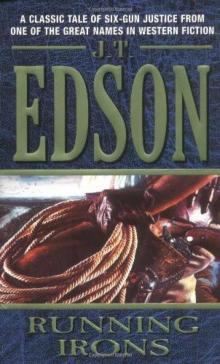 Running Irons
Running Irons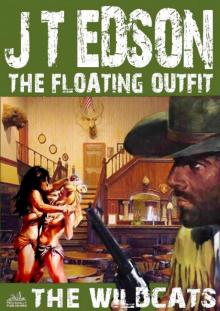 The Floating Outfit 19
The Floating Outfit 19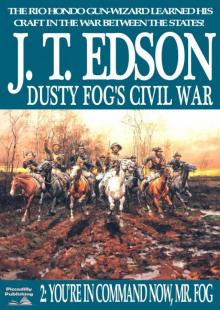 You're in Command Now, Mr Fog
You're in Command Now, Mr Fog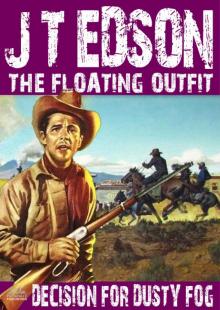 The Floating Outfit 27
The Floating Outfit 27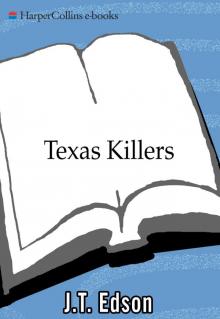 Texas Killers
Texas Killers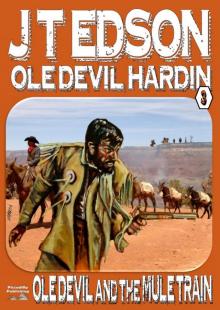 Ole Devil and the Mule Train (An Ole Devil Western Book 3)
Ole Devil and the Mule Train (An Ole Devil Western Book 3) Bunduki and Dawn (A Bunduki Jungle Adventure Book 2)
Bunduki and Dawn (A Bunduki Jungle Adventure Book 2)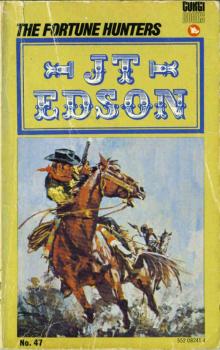 The Fortune Hunters
The Fortune Hunters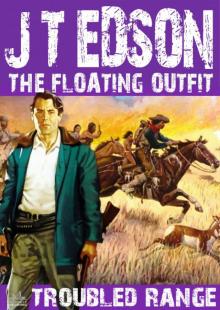 The Floating Outfit 12
The Floating Outfit 12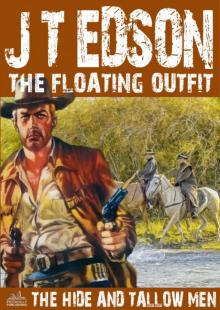 The Hide and Tallow Men (A Floating Outfit Western. Book 7)
The Hide and Tallow Men (A Floating Outfit Western. Book 7)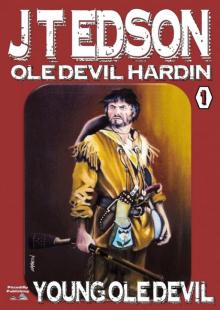 Young Ole Devil
Young Ole Devil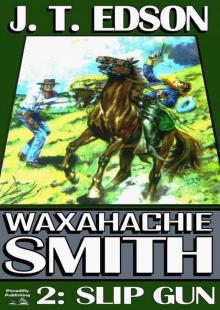 Slip Gun
Slip Gun The Drifter
The Drifter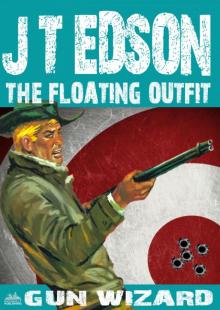 The Floating Outfit 45
The Floating Outfit 45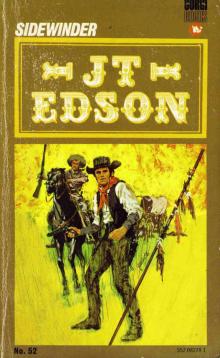 Sidewinder
Sidewinder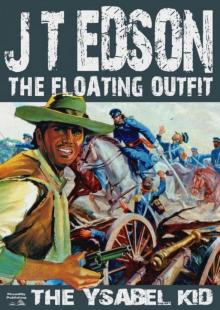 The Ysabel Kid
The Ysabel Kid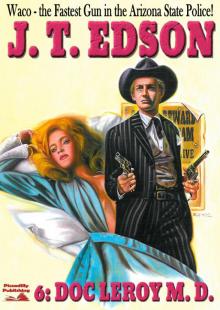 Waco 6
Waco 6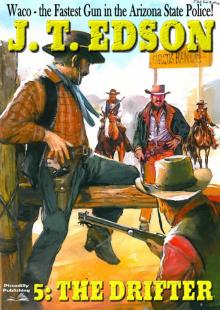 Waco 5
Waco 5 Point of Contact
Point of Contact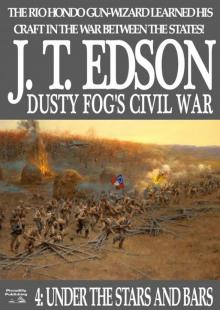 Under the Stars and Bars (A Dusty Fog Civil War Western Book 4)
Under the Stars and Bars (A Dusty Fog Civil War Western Book 4)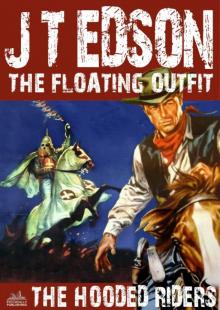 The Floating Outfit 9
The Floating Outfit 9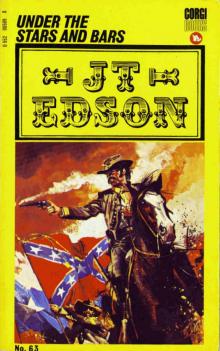 Under the Stars and Bars
Under the Stars and Bars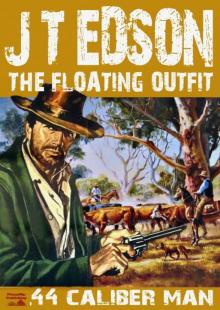 .44 Caliber Man
.44 Caliber Man The Floating Outfit 17
The Floating Outfit 17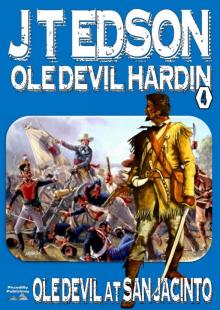 Ole Devil at San Jacinto (Old Devil Hardin Western Book 4)
Ole Devil at San Jacinto (Old Devil Hardin Western Book 4)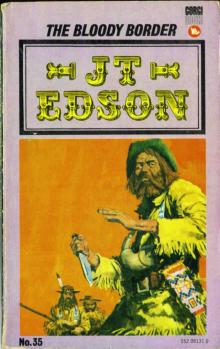 The Bloody Border
The Bloody Border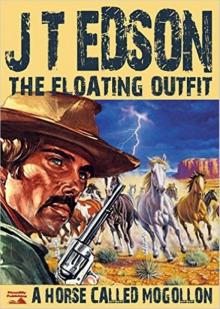 A Horse Called Mogollon (Floating Outfit Book 3)
A Horse Called Mogollon (Floating Outfit Book 3)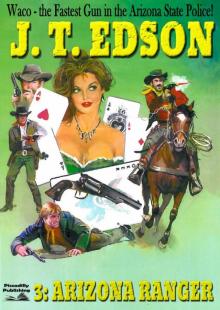 Waco 3
Waco 3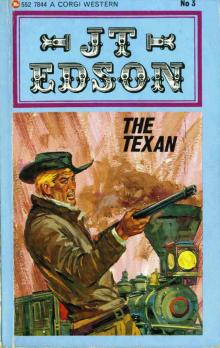 The Texan
The Texan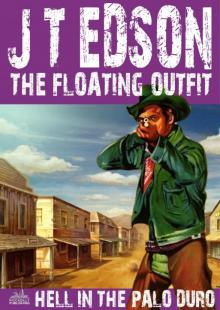 The Floating Outfit 35
The Floating Outfit 35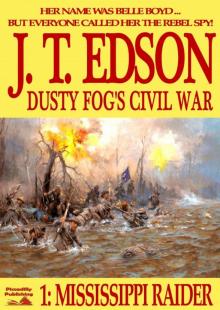 Mississippi Raider
Mississippi Raider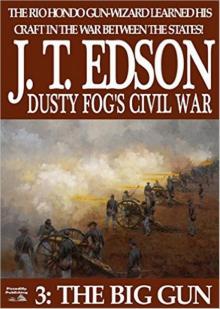 The Big Gun (Dusty Fog's Civil War Book 3)
The Big Gun (Dusty Fog's Civil War Book 3)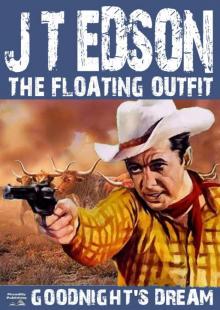 Goodnight's Dream (A Floating Outfit Western Book 4)
Goodnight's Dream (A Floating Outfit Western Book 4) Waco 4
Waco 4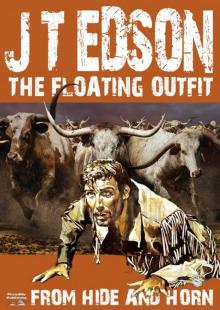 From Hide and Horn (A Floating Outfit Book Number 5)
From Hide and Horn (A Floating Outfit Book Number 5)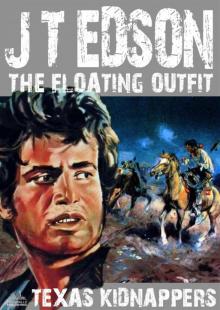 The Floating Outfit 18
The Floating Outfit 18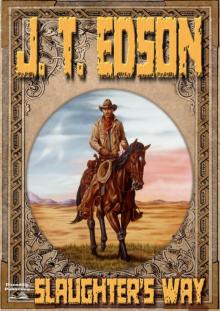 Slaughter's Way (A J.T. Edson Western)
Slaughter's Way (A J.T. Edson Western)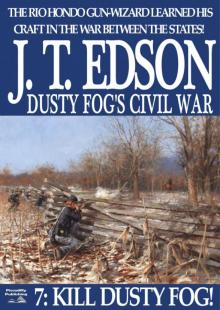 Dusty Fog's Civil War 7
Dusty Fog's Civil War 7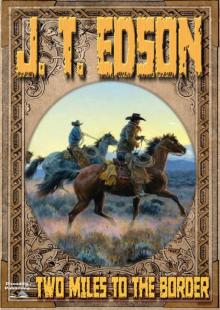 Two Miles to the Border (A J.T. Edson Western)
Two Miles to the Border (A J.T. Edson Western)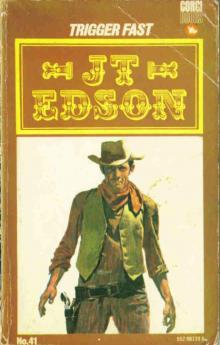 Trigger Fast
Trigger Fast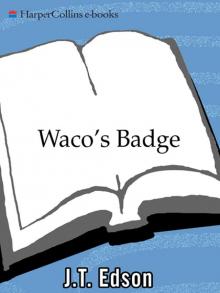 Waco's Badge
Waco's Badge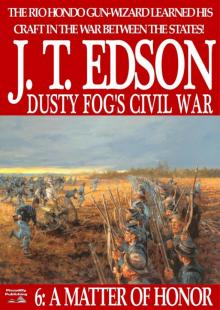 A Matter of Honor (Dusty Fog Civil War Book 6)
A Matter of Honor (Dusty Fog Civil War Book 6)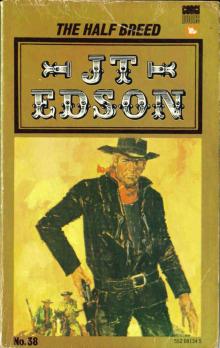 The Half Breed
The Half Breed Bunduki (Bunduki Series Book One)
Bunduki (Bunduki Series Book One)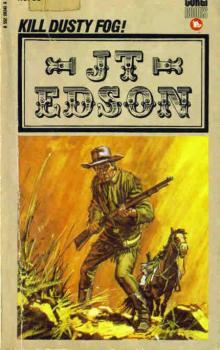 Kill Dusty Fog
Kill Dusty Fog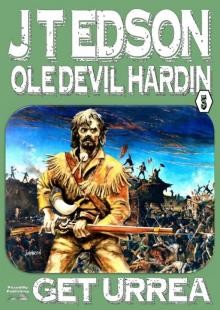 Get Urrea! (An Ole Devil Hardin Western Book 5)
Get Urrea! (An Ole Devil Hardin Western Book 5)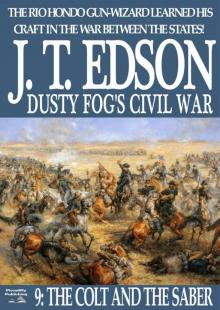 Dusty Fog's Civil War 9
Dusty Fog's Civil War 9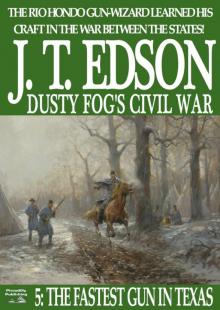 The Fastest Gun in Texas (A Dusty Fog Civil War Book 5)
The Fastest Gun in Texas (A Dusty Fog Civil War Book 5)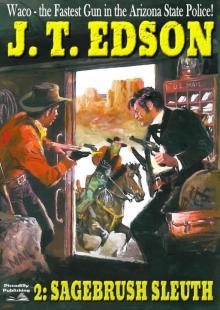 Sagebrush Sleuth (A Waco Western #2)
Sagebrush Sleuth (A Waco Western #2)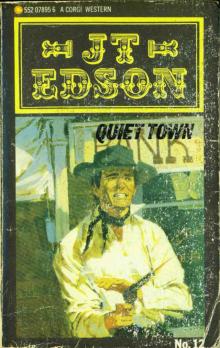 Quiet Town
Quiet Town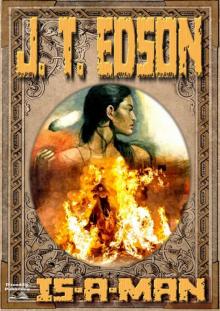 Is-A-Man (A J.T. Edson Standalone Western)
Is-A-Man (A J.T. Edson Standalone Western)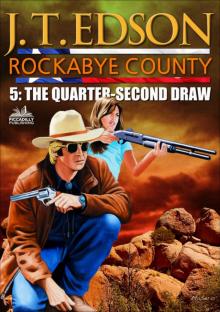 Rockabye County 5
Rockabye County 5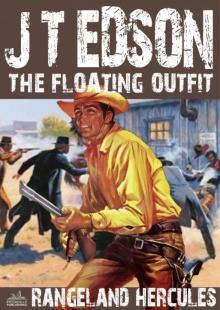 The Floating Outfit 14
The Floating Outfit 14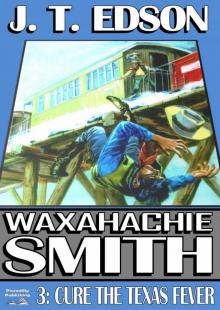 Cure the Texas Fever (A Waxahachie Smith Western--Book 3)
Cure the Texas Fever (A Waxahachie Smith Western--Book 3)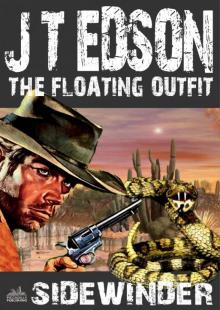 The Floating Outfit 13
The Floating Outfit 13 The Road to Ratchet Creek
The Road to Ratchet Creek